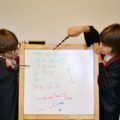What is Russian Maths?
Parents often ask me what “Russian Maths” is and how is it different from maths taught in England, after all, the numbers are the same. Yes, the numbers are the same, but the methods of teaching mathematics are very different.
Teaching of mathematics in the UK was influenced by Jean Piaget’s cognitive development theory. According to Piaget, adolescents start thinking in an abstract manner at the age of 11. It is believed that children are not ready to understand abstract mathematical concepts before adolescence. Therefore, there is no systematic approach to teaching of concepts, instead the children are taught mathematical rules and processes. It is not considered essential for them to fully understand at this stage how these rules and processes work.
The traditional Piagetian approach was dismissed by followers of a Russian psychologist Lev Vygotsky. According to Vygotsky younger children are better learners than adolescents. Vygotsky’s key theory is that learning is most effective within the Zone of Proximal Development (ZPD). ZPD is something that a child cannot yet do by himself, but only with the help of the More Knowledgeable Other. Young children have very dynamic ZPD and learning new concepts stimulates child cognitive development. In the nineteen fifties, the Russian maths educators Vasily Davydov and Daniil Elkonin (a prominent psychologist and student of Vygotsky) carried out experimental research in primary schools and developed a method of teaching mathematical concepts to young children. This method was further polished by a generation of maths educators and produced many outstanding mathematicians, engineers and scientists.
The Russian method of teaching mathematics is a process of assisted discovery. Guided by a teacher, children are not just learning mathematical rules, but are discovering these rules on their own. Children also learn how to solve real life problems using logic and mathematical reasoning. The new concepts are introduced gradually and systematically. The previously learned topics are constantly revisited and repeated at a deeper level challenging even the most able children.






